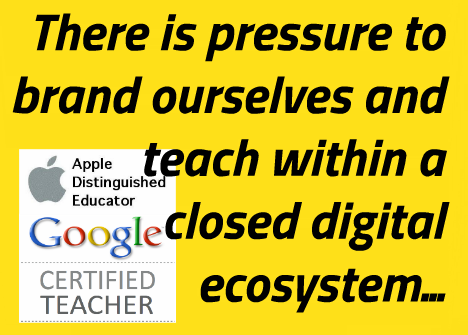 |
| Last week's Elearning Ontario Presentation |
 If you hyper focus on one thing you tend to get an inflated sense of your abilities. I wouldn't trust a mechanic who can only work on Ford brakes or a teacher who can only work out of Pearson textbooks, I'd have to assume they've learned by rote rather than developed mastery. I know it's hard work, but becoming fluent in digital tools requires some time, some curiosity and some humility and that's ok.
If you hyper focus on one thing you tend to get an inflated sense of your abilities. I wouldn't trust a mechanic who can only work on Ford brakes or a teacher who can only work out of Pearson textbooks, I'd have to assume they've learned by rote rather than developed mastery. I know it's hard work, but becoming fluent in digital tools requires some time, some curiosity and some humility and that's ok. |
| A colleague showed me this last year and it has been on my mind ever since. |
If you live within a monopolistic education technology environment you can never be sure what they are doing with the data they are managing for you 'for free'. That data is worth a lot of money. Even if it's being stripped of names, the ethics of exchanging student marketing data for a 'free' digital learning environment has to be questioned. In a monopolistic situation that questioning doesn't happen. Only an open, fair digital learning environment allows us to demand higher standards from companies who are otherwise singularly focused on making money in any way that they can.
 |
| Wouldn't an opensource hardware model that allows us to teach all technology platforms be a nice idea? The Learnbook |
http://blogs.edweek.org/edweek/DigitalEducation/2014/04/google_amends_its_terms_on_sca.html
"Google would not answer questions about whether its data-mining practices support the creation of profiles on student users.
Google also confirmed to Education Week that its general terms of service and privacy policy apply to student users of Apps for Education, a stance contrary to the company's earlier public statements."
http://www.osapac.org/cms/sites/default/files/Memo%20-%20Contract%20Addendums.pdf
 |
| OSAPAC has worked out a deal that doesn't sell off Ontario Students' data, but it's a secret, and each board has to implement it themselves. The mysteries of information in the information age... |
Tweets on this weekend's GAFE summit in Kitchener/Waterloo... the koolaid tastes good.
ro·nin
ˈrōnən/
noun
historical
- 1.(in feudal Japan) a wandering samurai who had no lord or master.
